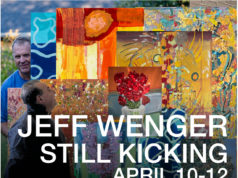If you’ve read this week’s Stage, then you know that that sloppy old fraud William Shakespeare goes crashing down to earth. His reputation will never recover. Western civilization has renounced “Bardolatry,” come to its senses, and pledged to broaden its theatrical diet. Or maybe not.
Seriously, though, Trinity Shakespeare Festival has confidently closed a seven year gap in the Fort’s cultural scene by guaranteeing a short professional season of the Bard every year. Introducing the lovely concepts of “indoor” and “a.c.” to summer Shakespeare can only cinch Trinity’s subscriber base, and that’s as we like it. T.J. Walsh’s forceful, moody staging of “Twelfth Night” is a good reminder why audiences were first smitten with the whole identity-switching, paradox-loving, iambic pentameter-twisting, toilet-humored Shakespearean universe.
However, I still believe that Shakespeare is endured more than enjoyed by many smart contemporary audiences, and the fault is not theirs. He is so titanic as a literary influence that his traces can be found everywhere. This is a kind of incontinence – he’s lost ownership of the tricks that he originally mastered. He is now too familiar, and this often results in unintentional parody, mediocrity, and creative autopilot by performers and audiences. I hope all Bard lovers will check out the essay collection “Shaw on Shakespeare.” As always, George Bernard Shaw was determined that people should poke around in the overgrowth of conventional wisdom and ask – and demand an answer to – “Why?” Here’s one of his gripes, prompted by more than a pinch of jealousy:
“Shakespeare found that the only thing that paid in the theater was romantic nonsense… and when he produced it – a feat which he performed easily and well – he publicly disclaimed any responsibility for its pleasant and cheap falsehood by borrowing the story and throwing it in the face of the public with the phrase ‘As You Like It.’”
Man, how often do you hear someone say that? If you want one example of a naughty, exotic 17th century playwright that FW audiences are missing, then look no further.











